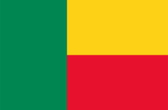
Call 0330 880 3600 Calls may be monitored or recorded. Opening Times.
- TRAVEL INSURANCE
- COVID-19 COVER
- More Options
- Help & Advice
- Existing Customers

Call 0330 880 3600 Calls may be monitored or recorded. Opening Times.

Need help?
UK Customer Services0330 880 3600*
Open Monday to Friday 9:00am to 6pm, Saturday 8:30am to 4pm and closed Sundays.
*Calls are recorded for training and quality purposes.

Official name: Republic of Benin
Capital city: Porto-Novo
Languages spoken: French (official), Fon, Yoruba, plus several northern languages
Population: Around 13 million
Currency: West African CFA franc (XOF)
Time zone: GMT+1
Driving side: Right
Climate: Equatorial in the south with two rainy seasons; hot and dry in the north with one wet season
Benin, on West Africa’s coast, is known as the birthplace of voodoo and the seat of the Kingdom of Dahomey. Its culture is expressed in bustling markets, traditional festivals, and striking heritage sites. Cotonou hums with commerce, stilt villages float on Lake Nokoué, and national parks in the north provide safaris with elephants, hippos, and lions.
Bordered by Togo, Nigeria, Burkina Faso, and Niger, Benin has a narrow Atlantic coastline and a mostly flat terrain that rises to savannah in the north. The south has two rainy seasons (April–July, September–November), while the north has a single wet season and a long dry period marked by harmattan winds from the Sahara.
Tourism is modest but growing, with attractions including the UNESCO-listed Royal Palaces of Abomey, voodoo festivals, and safaris in Pendjari and W National Parks. Roads are improving but can be rough away from main routes. Shared taxis and minibuses are common, though journeys can be long and crowded. Crime such as pickpocketing occurs in Cotonou - avoid carrying valuables openly and take care after dark. Political protests can sometimes disrupt urban life.
Most visitors, including British nationals, need a visa. Benin offers an eVisa system allowing online applications for stays of 15, 30, or 90 days. Passports must be valid for at least six months beyond your stay. A yellow fever vaccination certificate is required for entry. The nearest British diplomatic support comes via the High Commission in Accra, Ghana, as there is no UK embassy in Benin.
Benin uses the West African CFA franc (XOF), shared with seven other West African states and pegged to the euro. Cash is the main form of payment, especially outside Cotonou. Credit cards are accepted in major hotels and some businesses in cities, but far less in rural areas. ATMs are available in larger towns, though they may not always be reliable.
Healthcare facilities are limited, particularly outside major cities. Carry necessary medication, as supplies can be scarce. Comprehensive travel insurance, including cover for evacuation, is essential. Malaria is present year-round, and mosquito-borne illnesses such as dengue also occur. Drink bottled or treated water, and avoid ice in drinks. Recommended vaccines include hepatitis A, typhoid, yellow fever (mandatory), and rabies depending on activities. Tick precautions are sensible in rural areas.